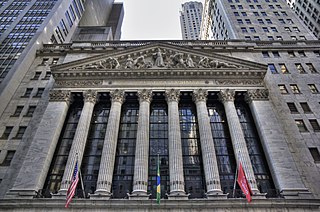Related Research Articles
The Nasdaq Stock Market is an American stock exchange based in New York City. It is ranked second on the list of stock exchanges by market capitalization of shares traded, behind the New York Stock Exchange. The exchange platform is owned by Nasdaq, Inc., which also owns the Nasdaq Nordic stock market network and several U.S.-based stock and options exchanges.

A stock exchange, securities exchange, or bourse, is an exchange where stockbrokers and traders can buy and sell securities, such as shares of stock, bonds, and other financial instruments. Stock exchanges may also provide facilities for the issue and redemption of such securities and instruments and capital events including the payment of income and dividends. Securities traded on a stock exchange include stock issued by listed companies, unit trusts, derivatives, pooled investment products and bonds. Stock exchanges often function as "continuous auction" markets with buyers and sellers consummating transactions via open outcry at a central location such as the floor of the exchange or by using an electronic trading platform.

A capital market is a financial market in which long-term debt or equity-backed securities are bought and sold, in contrast to a money market where short-term debt is bought and sold. Capital markets channel the wealth of savers to those who can put it to long-term productive use, such as companies or governments making long-term investments. Financial regulators like Securities and Exchange Board of India (SEBI), Bank of England (BoE) and the U.S. Securities and Exchange Commission (SEC) oversee capital markets to protect investors against fraud, among other duties.
The primary market is the part of the capital market that deals with the issuance and sale of equity-backed securities to investors directly by the issuer. Investors buy securities that were not previously traded. Primary markets create long term instruments through which corporate entities raise funds from the capital market. It is also known as the New Issue Market (NIM).

A financial market is a market in which people trade financial securities and derivatives at low transaction costs. Some of the securities include stocks and bonds, raw materials and precious metals, which are known in the financial markets as commodities.

A security is a tradable financial asset. The term commonly refers to any form of financial instrument, but its legal definition varies by jurisdiction. In some countries and languages people commonly use the term "security" to refer to any form of financial instrument, even though the underlying legal and regulatory regime may not have such a broad definition. In some jurisdictions the term specifically excludes financial instruments other than equities and Fixed income instruments. In some jurisdictions it includes some instruments that are close to equities and fixed income, e.g., equity warrants.
An initial public offering (IPO) or stock launch is a public offering in which shares of a company are sold to institutional investors and usually also to retail (individual) investors. An IPO is typically underwritten by one or more investment banks, who also arrange for the shares to be listed on one or more stock exchanges. Through this process, colloquially known as floating, or going public, a privately held company is transformed into a public company. Initial public offerings can be used to raise new equity capital for companies, to monetize the investments of private shareholders such as company founders or private equity investors, and to enable easy trading of existing holdings or future capital raising by becoming publicly traded.
A closed-end fund (CEF) or closed-ended fund is a collective investment model based on issuing a fixed number of shares which are not redeemable from the fund. Unlike open-end funds, new shares in a closed-end fund are not created by managers to meet demand from investors. Instead, the shares can be purchased and sold only in the market, which is the original design of the mutual fund, which predates open-end mutual funds but offers the same actively-managed pooled investments.
Penny stocks are common shares of small public companies that trade for less than one dollar per share.

The secondary market, also called the aftermarket and follow on public offering, is the financial market in which previously issued financial instruments such as stock, bonds, options, and futures are bought and sold. Another frequent usage of "secondary market" is to refer to loans which are sold by a mortgage bank to investors such as Fannie Mae and Freddie Mac.

B3 S.A.- Brasil, Bolsa, Balcão, formerly BM&FBOVESPA, is a stock exchange located in São Paulo, Brazil, and the second oldest of the country. At the end of 2011 it had a market capitalization of R$2.37 trillion, making it the 13th largest stock exchange in the world. However, owing to the slump in economic growth in Brazil associated with political problems, in addition to the strengthening of the United States dollar against the Brazilian real, the capitalization shrank to R$2.21 trillion by the end of 2015.

A rights issue or rights offer is a dividend of subscription rights to buy additional securities in a company made to the company's existing security holders. When the rights are for equity securities, such as shares, in a public company, it can be a non-dilutive pro rata way to raise capital. Rights issues are typically sold via a prospectus or prospectus supplement. With the issued rights, existing security-holders have the privilege to buy a specified number of new securities from the issuer at a specified price within a subscription period. In a public company, a rights issue is a form of public offering.
A follow-on offering, also known as a follow-on public offering (FPO), is a type of public offering of stock that occurs subsequent to the company's initial public offering (IPO).
A block trade is a high-volume transaction in a security that is privately negotiated and executed outside of the open market for that security. Major broker-dealers often provide "block trading" services—sometimes known as "upstairs trading desks"—to their institutional clients. In the United States and Canada a block trade is usually at least 10,000 shares of a stock or $100,000 of bonds but in practice significantly larger.
A direct public offering (DPO) or direct listing is a method by which a company can offer an investment opportunity directly to the public.

Microcap stock fraud is a form of securities fraud involving stocks of "microcap" companies, generally defined in the United States as those with a market capitalization of under $250 million. Its prevalence has been estimated to run into the billions of dollars a year. Many microcap stocks are penny stocks, which the SEC defines as a security that trades at less than $5 per share, is not listed on a national exchange, and fails to meet other specific criteria.
SWORD-financing is a special form of financing invented to help junior biotech companies access institutional capital markets to finance their R&D via establishing a special purpose entity and giving the investors partial rights to the outcomes of the R&D projects that they are funding.
A non-banking financial institution (NBFI) or non-bank financial company (NBFC) is a financial institution that does not have a full banking license or is not supervised by a national or international banking regulatory agency. NBFC facilitate bank-related financial services, such as investment, risk pooling, contractual savings, and market brokering. Examples of these include insurance firms, pawn shops, cashier's check issuers, check cashing locations, payday lending, currency exchanges, and microloan organizations. Alan Greenspan has identified the role of NBFIs in strengthening an economy, as they provide "multiple alternatives to transform an economy's savings into capital investment which act as backup facilities should the primary form of intermediation fail."

In finance, stock consists of all of the shares into which ownership of a corporation or company is divided. A single share of the stock means fractional ownership of the corporation in proportion to the total number of shares. This typically entitles the shareholder (stockholder) to that fraction of the company's earnings, proceeds from liquidation of assets, or voting power, often dividing these up in proportion to the amount of money each stockholder has invested. Not all stock is necessarily equal, as certain classes of stock may be issued for example without voting rights, with enhanced voting rights, or with a certain priority to receive profits or liquidation proceeds before or after other classes of shareholders.

Securities market participants in the United States include corporations and governments issuing securities, persons and corporations buying and selling a security, the broker-dealers and exchanges which facilitate such trading, banks which safe keep assets, and regulators who monitor the markets' activities. Investors buy and sell through broker-dealers and have their assets retained by either their executing broker-dealer, a custodian bank or a prime broker. These transactions take place in the environment of equity and equity options exchanges, regulated by the U.S. Securities and Exchange Commission (SEC), or derivative exchanges, regulated by the Commodity Futures Trading Commission (CFTC). For transactions involving stocks and bonds, transfer agents assure that the ownership in each transaction is properly assigned to and held on behalf of each investor.
References
- ↑ Goodwin Proctor LLP. "At The Market Offerings: Raising Equity Capital in Volatile Markets" Archived May 1, 2015, at the Wayback Machine , 2012. Retrieved on 10 December 2012.
- ↑ MedCity News. "At-the-market Offerings for Biotech Funding? Review 4 Quick Perspectives", 2012. Retrieved on 10 December 2012.
- ↑ McCarthy, Dennis. "ATM – At the Market Offering", 2012. Retrieved on 10 December 2012.
- ↑ Grocer, Stephen. "The Biggest Bank Capital Raisings: The List", The Wall Street Journal , New York, 4 December 2009. Retrieved on 13 November 2012.
- https://hklegal.hk/%e5%82%b5%e5%8b%99%e9%87%8d%e7%b5%84-iva%e7%94%b3%e8%ab%8b%e7%a8%8b%e5%ba%8f/ [1]
- https://blogs.wsj.com/deals/2009/12/04/historys-biggest-bank-capital-raisings-the-list/
- https://web.archive.org/web/20150501065542/http://www.goodwinprocter.com/Publications/Newsletters/REIT-Alert/2008/1229_At-the-Market-Offerings-Raising-Equity-Capital-in-Volative-Markets.aspx
- http://www.bassberry.com/files/Publication/478fa689-e31d-45a5-8726-023feb96ddac/Presentation/PublicationAttachment/077521e4-0c02-4715-8a98-0507fc9e1c77/C%26S%20Alert%20-%20August%2031,%202009.pdf%5B%5D
- http://capitalmarketalerts.com/equity-series/atm-at-the-market-offering/
- http://medcitynews.com/2011/08/at-the-market-offering-for-biotech-funding-review-4-quick-perspectives/
- ↑ Debt restructuring


